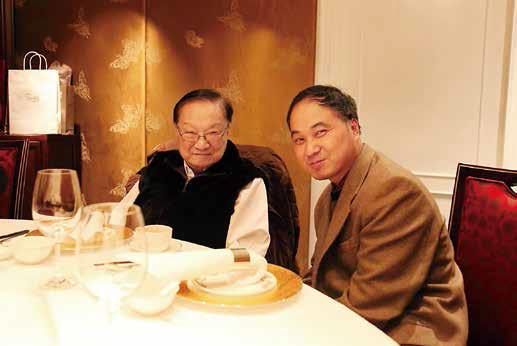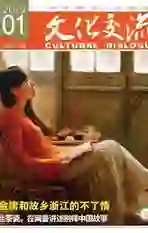It Was Nice Getting to Know You
2019-01-11LuDunji
Lu Dunji
I chanced upon Jin Yongs The Book and the Sword on my way to the Yellow Mountain. It was late September in 1981. I was traveling with several classmates from college. A young couple was sitting in front of us. The guy was so absorbed in reading a book that he totally ignored his girlfriend. I became curious, and stood up to peek at what he was reading.
Back in school, a classmate thrust a book into my hand. It was the first part of The Book and the Sword. I was so impressed by the engaging style of the language that I couldnt wait to read the second part of the novel. It was such a shame that, as a college student
majoring in Chinese literature, I had had no idea about Jin Yong and his works. I finished the reading within two days, regretting not having known the author earlier.

盧敦基和金庸合影(卢敦基提供)Jin Yong and Lu Dunji
My first encounter with Jin Yong was just like my discovery of The Book and the Sword. On April 4, 1997, I took part in the opening ceremony of the Louis Cha Scholarship newly set up for the Chinese Department of Zhejiang University, representing the school t o make a greeting speech. At the meeting held in the afternoon at the Hangzhou Botanical Garden, I plucked up my courage and took the chance to ask questions. Two years later, when I was reaching the finish line of the writing of my essay, titled On Louis Chas Novels, I realized how much I had been inspired by his candid answers on that sunny day.

“射雕三部曲”之一的《倚天屠龙记》1961年版本封面The cover des ign of The Heavenly Sword and Dragon Saber, one of the Condor Trilogy, published in 1961
I became one of the doctoral students of Jin Yong in 2003. Over the years, he was in Hangzhou many times to fulfill his teaching duties at the Faculty of Humanities of Zhejiang University. Hed arrange a meeting with us in the hotel lobby after taking a solid nap. Wed spend a couple hours, chatting about everything from our daily life to current affairs. He read our thesis proposal carefully and spent a lot of time writing comments.
When we met again at a hotel in downtown Hong Kong in the winter of 2011, I noticed his health was waning, although his thoughts were still sharp and his words witty.
Whenever I try to express how lucky I feel about getting to know such a great man, my words fail. The more I read his works, the more I admire his charisma. Over the years, I developed my own cognition and understanding of Jin Yong both as a wuxia novelist and as a person. His wuxia novels have a widespread following in Chinese communities worldwide, earning him a reputation as one of the greatest and most popular wuxia writers ever. He was the best-selling Chinese author. According to The Oxford Guide to Contemporary World Literature, Jin Yong's novels are considered to be of very high quality and are able to appeal to both highbrow and lowbrow tastes. Chinese nationalism or patriotism is a strong theme in Cha's works. In most of his works, Cha places emphasis on the idea of self-determination and identity. He expresses a fierce admiration for positive traits of the Chinese people. His works have the unusual ability to transcend geographical and ideological barriers separating Chinese communities of the world, achieving a greater success than any other contemporary writer.
The study of Cha's works has spun off a specific area of study and discussion: Jinology. For years, readers and critics have written works discussing, debating and analyzing his fictional world of martial arts. While some praised the engaging literary style of his wuxia creation, others dismissed his works as “unrealistic”. Despite all these varied opinions, his accomplishments as a writer out-distance any attempt at evaluation.
